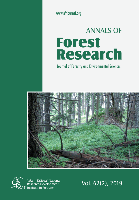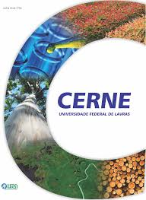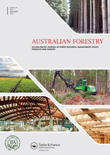
Forests
Scope & Guideline
Exploring the depths of forest ecosystems and management.
Introduction
Aims and Scopes
- Forest Ecosystem Dynamics:
Research focusing on the biological and physical interactions within forest ecosystems, including tree growth, species interactions, and responses to environmental changes. - Forest Management and Policy:
Studies that explore sustainable forest management practices, policy implications, and socio-economic impacts on forest resources. - Climate Change and Resilience:
Investigations into the effects of climate change on forest ecosystems and strategies for enhancing resilience and adaptation in forest management. - Forest Biodiversity and Conservation:
Research aimed at understanding biodiversity within forest ecosystems, its importance, and strategies for conservation and restoration. - Remote Sensing and Technology Applications:
Utilization of remote sensing, UAVs (drones), and other technological advances to monitor forest health, assess biodiversity, and support management decisions. - Soil and Nutrient Dynamics:
Studies on soil health, nutrient cycling, and their relationships with forest vegetation and ecosystem services. - Invasive Species and Pests:
Research on the impacts of invasive species and forest pests, including management strategies to mitigate their effects.
Trending and Emerging
- Sustainable Forest Management Innovations:
An increasing number of studies focus on innovative approaches to sustainable forest management, including agroforestry, mixed-species plantations, and resilience strategies. - Climate Change Adaptation Strategies:
Research addressing how forests can adapt to climate change is gaining traction, with studies exploring genetic diversity, species resilience, and management practices that enhance adaptability. - Technological Integration in Forestry:
The use of advanced technologies such as remote sensing, machine learning, and GIS for forest monitoring and management is rapidly emerging as a significant area of research. - Forest Ecosystem Services and Valuation:
There is an increasing emphasis on quantifying and valuing forest ecosystem services, reflecting a growing recognition of their importance in conservation and policy-making. - Microbial and Soil Health Studies:
Research on soil microbial communities and their role in forest health and productivity is becoming more prominent, highlighting the interconnectedness of soil and plant health. - Impact of Urbanization on Forest Ecosystems:
Studies examining the effects of urbanization on forest health, biodiversity, and ecosystem services are on the rise, addressing the challenges posed by expanding urban areas.
Declining or Waning
- Traditional Timber Production Techniques:
Research related to conventional timber harvesting methods has decreased as the focus shifts toward sustainable practices and innovative technologies. - Basic Ecological Studies without Management Implications:
Studies that purely describe ecological phenomena without direct applications to management practices are less frequent, reflecting a trend towards applied research. - Historical Forest Management Practices:
There has been a noticeable decline in publications focusing solely on historical practices, as contemporary issues and management strategies take precedence.
Similar Journals

Sumarski List
Advancing Forestry Knowledge for a Sustainable FutureSumarski List, published by the Croatian Forestry Society, serves as a key platform for the dissemination of knowledge and research within the field of forestry. Established in the early 1980s, this journal has maintained a consistent commitment to advancing the understanding of forest management, ecology, and conservation. With an ISSN of 0373-1332 and an E-ISSN of 1846-9140, it provides researchers and practitioners with valuable insights into current trends and practices in forestry, although it currently falls within the Q4 category in the 2023 forestry rankings. The journal is accessible primarily in printed format, promoting rigorous scholarship and discussion. The important contributions of Sumarski List are vital for fostering a greater appreciation of forestry in Croatia and beyond, making it an essential resource for those dedicated to tackling the pressing challenges in forest ecosystems.

Madera y Bosques
Championing Biodiversity and Climate ResilienceMadera y Bosques is a prominent academic journal specializing in the fields of forestry and wood science, published by INST ECOLOGIA A C in Mexico. With an ISSN of 1405-0471 and an E-ISSN of 2448-7597, it has established itself as a vital platform for disseminating research findings, innovative practices, and methodologies pertinent to sustainable forest management and ecological conservation. Operating since 2008, the journal covers a wide scope of topics related to the complexities of forest ecosystems, the importance of biodiversity, and the challenges posed by climate change. Despite its categorization in Q4 for the year 2023 in the Forestry category, Madera y Bosques aims to elevate discourse and practice in the field, providing a voice to emerging researchers and seasoned professionals alike. Additionally, the journal adheres to open access principles, enhancing the visibility and accessibility of its articles to a global audience. Researchers and practitioners are encouraged to engage with its rich content to further their understanding and impact in the world of forestry.

Lesnoy Zhurnal-Forestry Journal
Advancing Sustainable Forestry for a Greener TomorrowLesnoy Zhurnal-Forestry Journal is a prominent academic publication dedicated to advancing the field of forestry and environmental sciences. Published by the Northern Arctic Federal University M. V. Lomonosov, this journal focuses on innovative research, practices, and policies related to forestry management and conservation. With an Open Access model established since 2015, the journal ensures widespread dissemination of knowledge and foster collaborative research across global scholarly communities. Located in Arkhangelsk, Russia, the Lesnoy Zhurnal appeals to researchers, professionals, and students alike, providing a platform for sharing valuable insights and addressing emerging challenges in forestry. Though specific metrics like HIndex and Scopus rankings are presently unlisted, the journal is committed to excellence and aims to enhance its visibility and impact within the scientific community. This publication is not only a critical resource for ongoing research but a key player in shaping sustainable forestry practices in a rapidly changing environment, making it indispensable for anyone involved in forestry and environmental studies.

CANADIAN JOURNAL OF FOREST RESEARCH
Pioneering research for a greener tomorrow.Canadian Journal of Forest Research (ISSN: 0045-5067, E-ISSN: 1208-6037), published by Canadian Science Publishing, stands as a leading platform for disseminating cutting-edge research in the field of forestry and ecological sciences. With an impressive impact factor and a steady reputation for high-quality publications, this journal occupies a prestigious position indicated by its Q1 ranking in Forestry and Q2 in Ecology as of 2023, alongside commendable placements in global and planetary change studies. Covering a broad scope from sustainable forest management to the impacts of climate change on forest ecosystems, the journal encourages submissions that address contemporary challenges and innovations in forest research. Operating from its base in Ottawa, Canada, the Canadian Journal of Forest Research has been a cornerstone of academic discourse since 1974, offering researchers and professionals vital access to pioneering studies that inform policy and practice in forestry. Researchers, educators, and students alike will find this journal an indispensable resource for advancing knowledge and fostering collaboration in the vital realm of forest research.

Annals of Forest Research
Innovating research for a greener tomorrow.Annals of Forest Research is a peer-reviewed journal dedicated to advancing knowledge in the fields of forestry, ecology, and plant sciences. Published by EDITURA SILVICA in Romania, this journal has been an open access publication since 2008, providing a platform for researchers to share their insights and findings with a global audience. The journal operates under a rigorous selection process, reflected in its positioning within the Q2 category in Forestry and Q3 in both Ecology and Plant Science as of 2023. With Scopus rankings indicating a solid percentile among its peers, Annals of Forest Research continues to play a vital role in disseminating innovative research and fostering scholarly dialogue. Researchers, professionals, and students are encouraged to explore its diverse range of articles, which address both foundational and contemporary issues in forest management and environmental sustainability, contributing to the sustainable use and preservation of forest ecosystems.

FORESTRY CHRONICLE
Championing sustainable practices through rigorous scholarship.FORESTRY CHRONICLE, published by the Canadian Institute of Forestry, is a leading journal dedicated to advancing knowledge in the field of forestry and environmental science. With a rich history of dissemination of impactful research since its inception, this journal plays a crucial role in bridging the gap between theory and practice for professionals, researchers, and students alike. Based in Canada, the journal is indexed in Scopus, ranking within the Q3 quartile for the field of Forestry and demonstrating its commitment to quality and relevance in agricultural and biological sciences. While it does not currently offer open access, its circulation extends internationally, ensuring a wide reach for innovative ideas and findings in forest management, conservation, and ecological sustainability. As a vital resource, FORESTRY CHRONICLE continues to foster dialogue and collaboration among stakeholders invested in the sustainable use of forest resources, making it an essential addition to your academic repertoire.

FOREST SCIENCE
Exploring innovative solutions for ecological challenges.FOREST SCIENCE, published by Oxford University Press Inc, is a pivotal journal in the field of forestry and ecological modeling, boasting an impressive track record since its inception in 1970. With an ISSN of 0015-749X and E-ISSN 1938-3738, the journal provides a valuable platform for the dissemination of high-quality research and studies that address contemporary challenges in forestry and ecology. It ranks in the Q2 category for both ecology and forestry and holds a Q3 ranking in ecological modeling according to the latest evaluations, illustrating its significant contribution to these fields. The journal is accessible through various options, facilitating broad readership and engagement within the academic community. As part of its commitment to advancing knowledge and practices in forest management and conservation, FOREST SCIENCE seeks to bridge theoretical research with practical applications, making it an indispensable resource for researchers, professionals, and students alike.

Forestist
Connecting scholars to cultivate forestry knowledge.Forestist, published by AVES, is a pivotal open-access journal dedicated to the field of Forestry, providing a platform for researchers, professionals, and students to explore cutting-edge developments and research within the discipline since 1980. Operating from Turkey, this journal offers a unique opportunity for scholars to share their findings with a broad audience, contributing to the global discourse on sustainable forest management, conservation practices, and ecological research. With an impressive impact factor and a current categorization in the Q3 quartile for 2023, Forestist ranks among the essential resources in Agricultural and Biological Sciences, particularly within the realm of Forestry, as indicated by its Scopus ranking of #119 out of 174 journals. This publication is committed to fostering open access to knowledge, making research freely available while encouraging innovative studies that address the pressing challenges in forestry and environmental science.

Cerne
Illuminating Pathways to Sustainable Forest ManagementCerne is a distinguished open-access journal dedicated to advancing knowledge in the field of forestry, published by the Universidade Federal de Lavras (UFLA). Since its inception in 1994, the journal has actively contributed to the global discourse on sustainable forest management and biodiversity conservation, presenting research findings that are both relevant and impactful. With its ISSN 0104-7760, Cerne aims to foster collaboration among researchers, professionals, and students, enhancing the understanding of forestry practices in Brazil and beyond. As of 2023, it holds a respectable Q3 ranking in the forestry category, further cementing its position within the academic community, illustrated by a Scopus ranking of #97 out of 174 in the Agricultural and Biological Sciences - Forestry field. Operating under an open-access model allows for wide dissemination of research outputs, ensuring that critical findings reach a broad audience, fueling further innovation and discovery in the field. With converged years extending from 2007 to 2024, Cerne continues to be a vital resource for anyone engaged in forestry research and practices.

AUSTRALIAN FORESTRY
Elevating the Discourse on Forestry ScienceAustralian Forestry is an esteemed journal dedicated to advancing knowledge in the field of forestry and related environmental science. Published by Taylor & Francis Australia, this journal plays a pivotal role in disseminating high-quality research that spans various aspects of forestry, including sustainable management, conservation practices, and policy analysis. With an impact factor reflecting its significance in the academic community and a Scopus rank of #44 out of 174 in the category of Agricultural and Biological Sciences, Australian Forestry proudly holds a Q2 ranking in its field as of 2023. The journal has maintained a continuous publication record since its inception in 1936, with a commitment to addressing contemporary challenges within forestry. Researchers, professionals, and students alike are invited to engage with this vital resource that fosters insightful dialogue, innovative solutions, and a deeper understanding of forestry science.